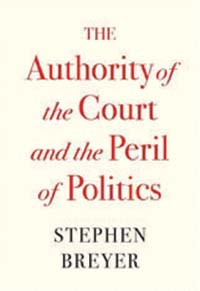
Author: Stephen Breyer
Publisher: Harvard University Press
ISBN: 978067426936
RRP: £15.95
Stephen Breyer is an Associate US Supreme Court Justice. His short book The Authority of the Court and the Peril of Politics is the product of his lecture that should have been given at the Scalia Lecture 2021 but the pandemic intervened. And a super little book it is dealing with the relationship between the Supreme Court and the executive; highly apposite here and in the US.
Why generally (but not always) do people and governments accept a court decision as conclusive without significant protest? Cicero wrote of the nature of acquiescence and obedience to state power arising from three factors—punishment, rewards and belief that the state is a just one. Breyer’s thesis is that the Supreme Court relies on the latter in its dealings with government.









